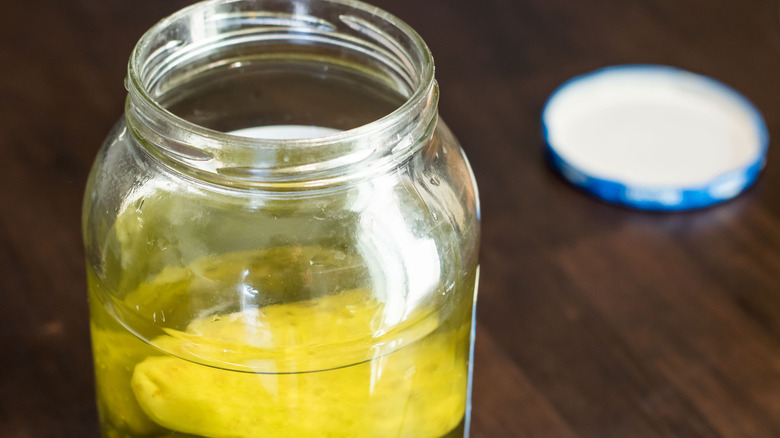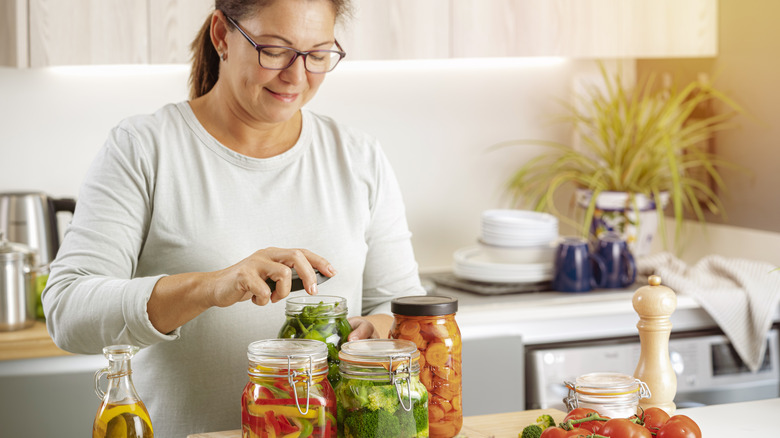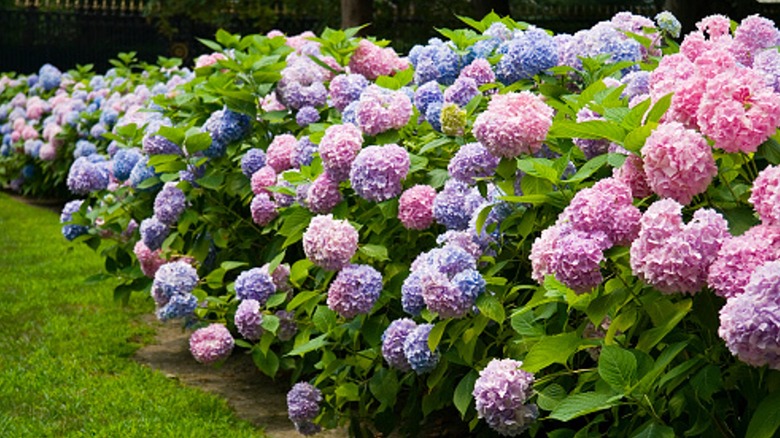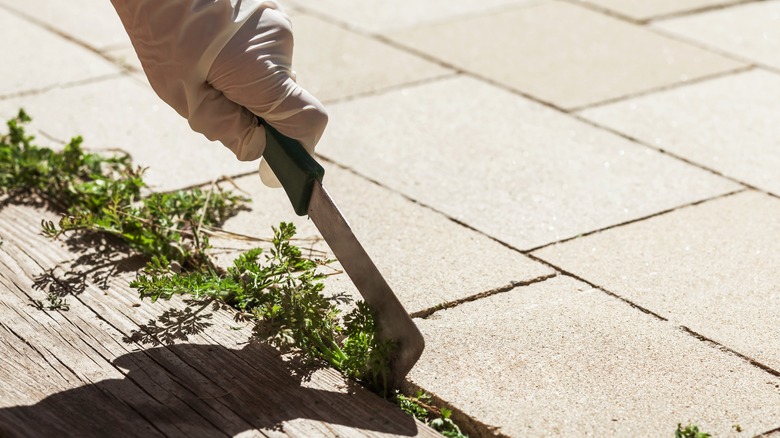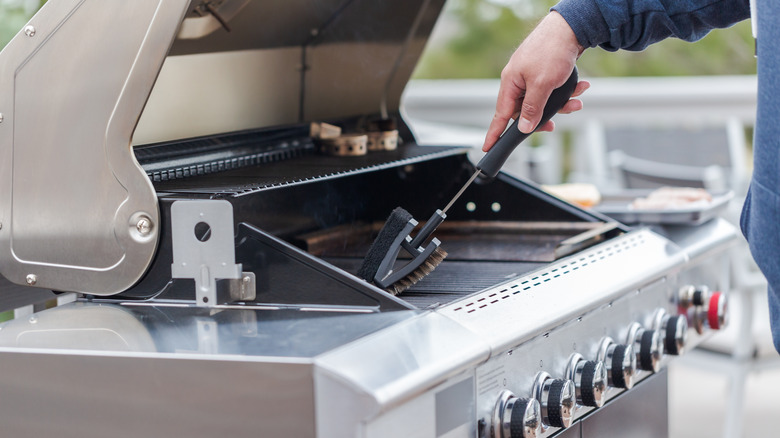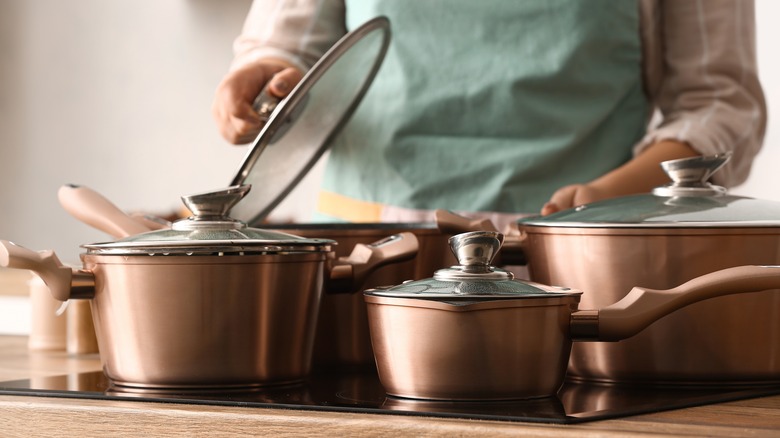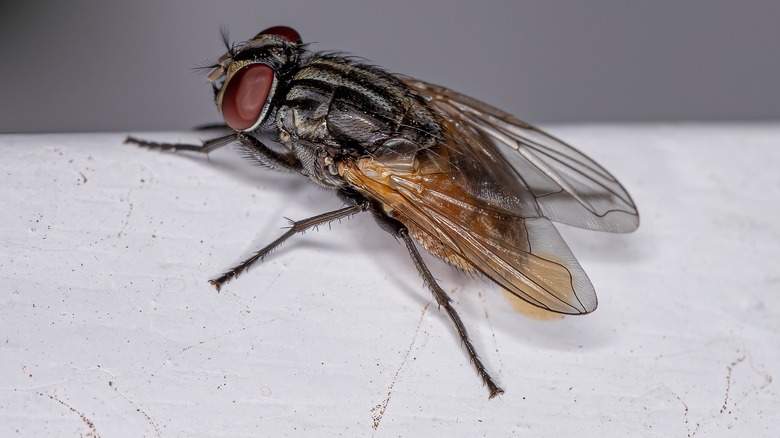Unexpected Ways To Use Pickle Juice Around Your Home And Garden
After finishing a jar of pickles, there is often quite a bit of juice left over. If you've ever stared at all that leftover brine and wondered if there was some way to recycle or reuse it, this is your lucky day. There are several ways you can reuse the juice around the house, and some of them are quite unexpected and surprising. From use as a soil amendment in your flower beds to restoring the shine to your copper pots, there are lots of interesting and inventive ways to use pickle juice around the house and garden. You can even try using it to clean your grill or stove.
Unfortunately, bad advice abounds online. So, we'll also warn you that there are a few things you shouldn't do with pickle juice. But for the most part, instead of throwing your leftovers away, you can check out some safe and simple home and gardening hacks that are worth a try.
Pickle other vegetables
You shouldn't use pickle juice to make new pickles. The brine you use for this purpose requires a certain amount of salt and vinegar to prevent bacteria and preserve the food long-term. And, some of those ingredients are absorbed by the original pickles. So, leftover juices may no longer have the proper ratio needed to keep new shelf-stable pickles safe. You can, however, use leftover brine to fridge pickle other vegetables. This is a great way to squeeze some extra life out of your garden when the harvest is plentiful and you get a few more veggies than you bargained for.
To pickle fresh produce, boil the pickle juice on the stove or in the microwave. Put the veggies in a jar, pour the boiling juice over them, and close the lid. You should let the veggies sit in the fridge for at least 5 hours before serving them and you can safely store them there for up to a week. Vegetables that work well for this include onions, carrots, garlic, and green beans.
Remove rust
Vinegar is an effective rust remover. Pickle juice is full of vinegar and can be used to remove oxidation. This is a great trick for cleaning old rusty tools. You'll want to have some baking soda handy too as this will neutralize the acid in the vinegar when you're done removing the rust. This ensures that it doesn't go too deep and begins pitting the surface of your tools.
To remove rust, soak the rusty item in the pickle juice or soak a paper towel with the juice and wrap the item in it. Leave it to soak for 3 to 24 hours depending on the severity of the rust. Then, neutralize the acid in the pickle juice by sprinkling the tool with baking soda. You can then scrub the rust away, rinsing the area in warm water when you're done. You can use an abrasive scrubber like steel wool to help remove the rust if necessary.
Give your plants a boost
Some plants just love acidic soil, and pickle juice is full of acidic vinegar. You can use this pickle juice gardening hack to boost your hydrangeas, rhododendrons, azaleas, and other acid-loving plants. It's generally a good idea to test your soil before applying brine, however, as it may already be acidic enough. If not, some pickle juice may be the perfect soil amendment as it also contains Lactobacillus. This beneficial bacteria helps break down organic matter in the soil so that it is more readily available for plants. Plus, it suppresses the growth of certain fungi and harmful bacteria that can make plants sick.
To use pickle juice in the garden effectively, you must dilute it because of the salt content. For use as a soil amendment, apply it near but not directly on the plants or their roots. You can also use the brine as a foliar spray to improve plant health, but you must dilute the pickle juice in copious amounts of water when using it this way. If you want to make sure it is mild enough, test it on a few leaves before spraying the entire plant.
Use as a natural weed killer
While pickle juice can help acid-loving plants when properly applied as a soil amendment, the acid in the vinegar as well as the salt can be deadly to other plants. However, this makes it perfect when you're battling weeds. You may need to keep it far away from your landscaping beds to avoid hindering your favorite flowers. So, many gardening experts claim that it's an excellent weed killer for ones that are sprouting in cracks in your sidewalk or driveway.
To try this hack for yourself, simply pour the juice into a spray bottle and douse the offending weeds. When using it as a soil amendment you want to dilute it, but you'll want it at full strength for this purpose. If you have more mature weeds, you can simply pour some juice on them for a more concentrated effect. Then, go back and remove the dead remnants later.
Clean the stove and grill
Pickle juice is mostly vinegar, and according to research, vinegar makes a great cleaner for stubborn dirt around the house. In fact, pickle juice is an excellent cleaner for your grill or stovetop. You can pour it on, let it sit for a few minutes, and then scrub your grill or (more gently) your stove.
A grill is typically made of pretty tough materials, so check the manual to see if you can use a wire brush to clean the grates. Many users also recommend using balled-up aluminum foil. Be more careful with your ceramic stovetop, however, and make sure you use only nonabrasive sponges and cloths when cleaning it to avoid scratches. If you have stuck on grime, let the juice sit and soak before wiping it away. Some people also report that cleaning their stovetop while it's still a little warm can make the job easier.
Shine copper pots and pans
Copper pans have a beautiful luster but they can lose their shine as you use them in the kitchen. But, leftover pickle juice can restore their gleam. This awesome trick is backed by science and has to do with a chemical reaction. Copper dulls when its atoms combine with oxygen and create copper oxide. When mixed as they are in pickle juice, acid (vinegar) and salt dissolve this copper oxide and leave your pots gleaming like new.
To clean your copper pans, soak them in a dish of pickle juice for 15 minutes. After soaking, wash and rinse as normal. For larger pots, you may need to apply the liquid with a cloth. You can also use pickle juice to patina new pots if you prefer that aesthetic. If you want to give new copper a more aged look, apply pickle juice in the same way you would to shine it but don't rinse it right away. Leave it in contact with the surface, and it will create a blue or green patina.
Make a fly trap
It can be tough to get rid of flies that invade your space. Whether you're dealing with a single pest or have some fruit flies hanging around your kitchen, you can use pickle juice to make a fly trap. The liquid makes a great lure for your trap since flies are naturally attracted to the vinegar in it.
Making a trap is easy. Simply place the juice in a dish and then add a few drops of dish soap on top. The pickle juice will attract the flies and the soap will trap them, killing them. You can also use pickle juice to trap slugs in the garden. Just place the juice in a shallow dish or, better yet, bury the dish so the top edge is level with the soil. The juice will lure them in and the salt in the brine will do the rest.
A few pickle juice don'ts
If you're online looking for ways to use leftover pickle juice, you're bound to run into a few bad ideas. Some websites suggest spraying pickle juice on furniture or areas you want dogs to stay away from. The problem with this theory is that many dogs are food-motivated, and pickles are food. Their juice also contains high concentrations of sodium and can lead to salt poisoning in dogs. Plus, there's the fact that pickle juice can stain fabrics, so spraying it on the couch or carpet is a bad plan.
While it may work to trap a few flies and slugs, you shouldn't rely solely on pickle juice for pest control either, especially if you have a significant insect issue. Vinegar, and therefore pickle juice, is thought to repel many bugs, including ants, mosquitos, and spiders. Unfortunately, the only evidence for this is anecdotal. Pest control professionals like Orkin claim that these treatments generally don't work well, And if they do work, their effects are very short-lived. It's best to file this one under the heading of urban myth and use a more reliable pest control method.
